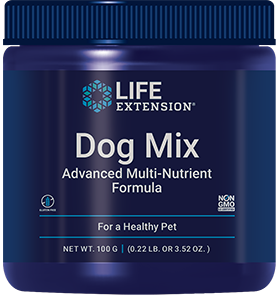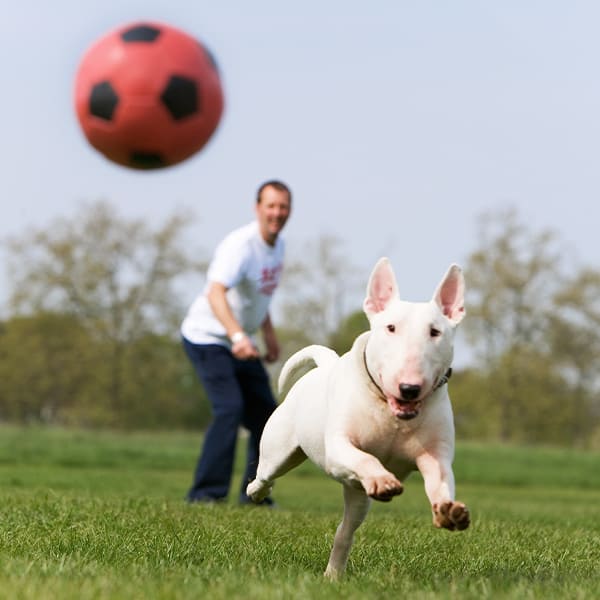
Healthy Joints: Best Nutrients for Dogs
Published: December 2023
Who doesn’t love a lap dog lounging in his favorite sunny spot? Or a big pooch, belly up on the couch snoring post-play? These moments make us smile. But all pet parents know that our dogs also need to race, chase, leap, spin and move to stay healthy.
Much like humans, all that running around fetching toys, chasing kids, and bounding up and down stairs can take a toll on a dog’s joints. Wondering what you can do to help your pooch maintain maximum mobility and stay active for years to come?
Adding a high-quality joint supplement to your dog’s diet can be a proactive way to help your furry friend live their best dog life. Of course, you’ll want to consult your vet before giving your pooch a joint supplement, but here’s some information to get you started.
What are joint supplements for dogs?
Whenever our everyday menu lacks the vitamins to maintain our best physical health, we turn to supplements to complement our diet. The same is true for pet supplements—they offer complementary support to their overall health. Joint supplements for dogs deliver nutrients like glucosamine and MSM that have been formulated to help support dogs' joint health and comfort.
Let's break it down. These nutrients can help support cartilage, the connective tissue found at the ends of bones in the joint areas that act as a cushion. Maintaining the strength and flexibility of cartilage is imperative because it's essential for proper joint function and overall mobility.
When searching for the right joint supplement, you'll want to scan the label for joint-friendly ingredients like glucosamine, methylsulfonylmethane and palmitoylethanolamide. Any joint supplement for dogs worth its salt will have one—or better yet, ALL—of these active ingredients. Here's a breakdown of each and why it's crucial for your dog's joint health:
1. Glucosamine
Glucosamine is a natural sugar compound found in cartilage (the superhero of joint movement!). It is often the foundational ingredient in a hip and joint health supplement. In research on humans, glucosamine has been found to encourage knee joint comfort.
2. Methylsulfonylmethane
Methylsulfonylmethane—MSM for short—is another compound that has been known to be very effective in supporting a healthy inflammatory response in humans. When used in combination with glucosamine, MSM has been shown to support overall joint health and comfort. This glucosamine-MSM combo is fairly common in pet joint supplements. And it can be a proactive way to help support your dog's healthy joints.
3. Palmitoylethanolamide (PEA)
Palmitoylethanolamide (PEA) is a fatty acid amide and lipid modulator produced by the body as needed to support cellular health. Adding PEA to the joint supplement mix will further support joint comfort.
Maybe your pup (senior dog or not) is a picky eater or turns up his nose at soft chews of any kind. No worries! Joint supplements for dogs come in a variety of delicious flavors, including beef-flavored soft chews, chewable tablets or powders, so there's something that's right for even the fussiest of furry friends.
Is Chondroitin Good for My Dog?
Chondroitin sulfate is one of the building blocks of canine and human cartilage. Chondroitin sulfate is also a common ingredient used as a dietary supplement to support healthy cartilage and joint function. But chondroitin sulfate is not the only ingredient that encourages joint health and comfort. Research suggests a combination of glucosamine, PEA and MSM also help promote connective tissue health and support hip and joint comfort.
How can I support my dog’s joint health?
When it comes to your adult pup's joints (because all dogs are pups in our eyes), there are a few ways you can help maintain their mobility and strength. You'll want to start by looking at their diet—ensuring they eat balanced meals, including protein and fatty acids, that support their overall well-being. Plus, throwing in an occasional superfood treat can give your best friend's body a nutritional boost.
Once your dog has a nutritious diet and powerhouse treats in the mix, you'll want to make sure your pooch gets out and moves. Regular exercise helps keep muscles toned, joints flexible and weight in check. Because extra pounds can put a lot of pressure on joints, maintaining a healthy weight is crucial for overall hip and joint health and comfort. Your dog's vet can guide you on how much and what type of exercise they need.
Is My Dog Eating a Balanced Meal?
Just like us, our dogs need essential nutrients like proteins, fatty acids and carbohydrates, but a balanced diet must also include an adequate amount of vitamins, minerals and probiotics (yes, your dog needs those, too!). A commercial dog food will likely have all the nutrients your dog needs. Plus, your dog's veterinarian can also help you ensure your pooch is getting everything they need to stay active and healthy. Your vet can also recommend additional dietary support, like high-quality chewable tablets or soft chews, to help support other areas of your dog's health, like helping them stay calm during fireworks, deliveries, car rides or when you're away.
How do I know if my dog needs a joint supplement?
As with humans, signs of uncomfortable joints can show up as your pet ages. Senior dogs will need additional joint support from all their adventures over the years.
Regardless of your dog's age and weight, if you notice any changes in their behavior, it may be an indication that your cuddle muffin's joints aren't comfortable. Give your pet's veterinarian a call to find out if what you're seeing is related to their joint health.
Should I give my dog a joint supplement every day?
The amount and frequency you give your pooch joint supplements depends on the type of soft chew, weight and overall joint function. Once your fur baby's vet determines that a joint supplement is right for pooch, follow their advice and the directions on the product's label. Of course, every pooch is different. For example, small dogs might need a single daily dose (in the form of soft chews or powder), while large dogs will need a higher dose.
Whether you choose an all-in-one supplement or a combination of glucosamine, MSM or PEA, a high-quality supplement that is specifically formulated for dogs is your best option to help support your dog's joint health and function.
References
- Bhathal A, et al. "Glucosamine and Chondroitin Use in Canines for Osteoarthritis: A Review." Open Vet J. February 2017. https://www.ncbi.nlm.nih.gov/pmc/articles/PMC5356289/
- Marini I, et al. "Palmitoylethanolamide versus a nonsteroidal anti-inflammatory drug in the treatment of temporomandibular joint inflammatory pain." J Orofac Pain. 2012. https://pubmed.ncbi.nlm.nih.gov/22558609/
- Noli C, et al. "Efficacy of Ultra-Micronized Palmitoylethanolamide in Canine Atopic Dermatitis: An Open-Label Multi-Centre Study." Vet Dermatol. December 2015. https://pubmed.ncbi.nlm.nih.gov/26283633/
- Usha PR, Naidu MUR. "Randomised, Double-Blind, Parallel, Placebo-Controlled Study of Oral Glucosamine, Methylsulfonylmethane and Their Combination in Osteoarthritis." Clin Drug Investig. 2004. https://pubmed.ncbi.nlm.nih.gov/17516722/
- Vo NX, et al. "Effectiveness and Safety of Glucosamine in Osteoarthritis: A Systematic Review." Pharmacy (Basel). July 2023. https://pubmed.ncbi.nlm.nih.gov/37489348/
- "How to Keep Your Dogs Joints Healthy." Purina. August 2019. https://www.purina.com/articles/dog/health/joint-health-for-dogs
- "Signs of Joint Pain in Dogs: Types, Causes and Treatment." Caring Hands. https://www.denvervet.com/site/blog/2021/07/15/signs-of-joint-pain-in-dogs
Always be in the know!
Access the latest deals, wellness news, expert health tips & more!









